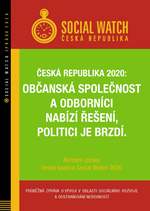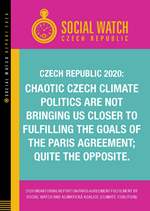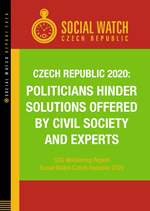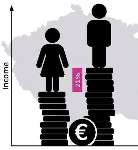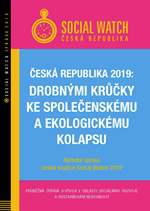Czech Republic
Published on Fri, 2022-07-29 17:01
This year's report of the Social Watch for the Czech Republic focuses on three areas: the economy, health and care and socio-economic transformation. The report responds to the ramifications of the Covid-19 pandemic, but it also reflects on issues related to the conflict in Ukraine, in particular the impact of rising energy prices and inflation.
In the report, economist Ilona Švihlíková criticises the absence of national economic policy and chaotic conduct of the governments (there was a change in administrations after last year’s October elections) throughout the pandemic, as well as its unsystematic and antisocial tax policy.
|
|
<p><em>Editor: Jiří Silný</em></p>
<p><em>Authors: Ilona Švihlíková, Tomáš Tožička, Dagmar Žitníková, Václav Drozd, Radek Kubala, Milan Smrž, Josef Patočka</em></p>
<p>This year's report of the Social Watch for the Czech Republic focuses on three areas: the economy, health and care and socio-economic transformation. The report responds to the ramifications of the Covid-19 pandemic, but it also reflects on issues related to the conflict in Ukraine, in particular the impact of rising energy prices and inflation.
In the report, economist Ilona Švihlíková criticises the absence of national economic policy and chaotic conduct of the governments (there was a change in administrations after last year’s October elections) throughout the pandemic, as well as its unsystematic and antisocial tax policy. "Probably the most telling aspect of the efforts of the previous and current governments in response to the pandemic is the lack of any comprehensive summary - a review of failures, why some processes took too long, what will be the long-term effects of the pandemic etc." It is clear that even in the current crises related to the Ukraine conflict the new government does not intend to approach the growing social issues systemically and does not have the resources to do so, because both the previous and current governments have failed, in particular with regard to tax policy: “The common feature of these measures is the fact that they are not systemic; tax policy is made like ‘cutting a salami’, without regard to the needs of the state, the amount of the tax quota etc. The issue of tax justice is being ignored entirely. It is clear that the majority of tax policy changes have been made to benefit the wealthiest demographic". This increases social tension - protests and warnings from the unions are on the rise in early summer. “The Czech society is psychologically and socially exhausted after the pandemic; the issue of social peace is more pressing than ever before. Unfortunately, the government so far does not seem to understand the gravity of the situation and makes no effort to face the dynamically evolving inflation, e.g. by the way of pricing legislation.”</p>
|
Published on Tue, 2020-11-03 00:00
Social Watch Czech Republic releases an annual report evaluating the progress of the Czech Republic towards reaching the UN Sustainable Development Goals. The report is divided into five sections: people, planet, prosperity, peace, and partnership.
The Czech Republic is failing to meet many of the UN sustainable development targets, with progress only visible in certain areas, according to a report last week from Social Watch CZ, a non-governmental organization that monitors compliance with the goals.
|
Published on Wed, 2020-09-30 00:00
Our current civilization could have emerged only thanks to suitable climatic conditions which arose with the end of the last ice age about 10 000 years ago. A stable and favourable climate enabled people to settle, build settlements, engage in agriculture, and develop technically and culturally. Approximately 200 years ago, the discovery that it was possible to obtain energy through burning fossil fuels led to an industrial revolution, to a further acceleration of technical progress, and to a huge increase in the world’s population as well.
|
|
Source: 
. Published on Wed, 2020-08-05 00:00
Social Watch Czech Republic releases an annual report evaluating the progress of the Czech Republic towards reaching the UN Sustainable Development Goals. The report is divided into five sections: people, planet, prosperity, peace, and partnership.
The Czech Republic is failing to meet many of the UN sustainable development targets, with progress only visible in certain areas, according to a report last week from Social Watch CZ, a non-governmental organization that monitors compliance with the goals.
|
Published on Tue, 2020-07-21 00:00
Five years ago, as part of the United Nations Summit on Sustainable Development, all UN member states ratified the Sustainable Development Goals. In 2017, the government of the Czech Republic ratified the strategic document “Czech Republic 2030” whose goal was to improve the quality of life across all the regions and to put Czechia on a path to development which would be sustainable in its social, economic and environmental impacts.
|
Published on Thu, 2020-06-18 00:00
This year marks the 25th anniversary of the Fourth World Conference on Women held in 1995 where the Beijing Declaration and Platform for Action were first adopted embodying the goals and recommended actions for improving women‘s access to their rights in 12 key areas.
The presented monitoring report of the Czech Social Watch Coalition on Gender Equality focuses in four studies on the following areas of the Beijing Platform for Action: women and poverty, violence against women, women and economic inequality, and women in decision-making positions.
|
Published on Tue, 2020-02-25 10:05
The Czech Republic has enjoyed steady economic growth, low inflation and low unemployment in recent years. Income inequality (Gini coefficient 0.25) is the third lowest among OECD countries. In 2018 the proportion of citizens at risk of income poverty (relative poverty - with an income of 60% or less of the national median) were about 10% of the population, while those in absolute poverty (‘materially deprived’) were 8% of the population. Older citizens (65+ years) are worse off than other age groups. In 2018, 10% of households with children (30% of which were single- adult households - single mother or single father) found themselves in income poverty. Furthermore, Czechia has one of the highest proportions of homeless people in the European Union (0.65 % of the population).
|
|
Published on Wed, 2019-09-18 00:00
|
SUSCRIBE TO OUR NEWSLETTER
Submit

|


